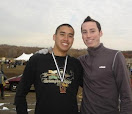Recently, I watched the 13th episode of "Workout Wednesday" on Flotrack.org
It's a pretty neat idea, the website has a crew that heads over to university teams, sponsored running programs, even just elite athletes and tapes the workouts that they do in order to broadcast it to the public.
This week they went over to "Team Indiana Elite" at St. Vincents sports center in Indianapolis, Indiana and filmed their supplement and core routine.
Link: http://www.flotrack.org/videos/coverage/view_video/234127/100476-episode-13-team-indiana-elite-core
Robert Chapman, the coach of Team Indiana Elite, stressed that Core, flexibility, strength, and cardio work are all necessary for a runner to get the most of out of his or her running. I was impressed by the video, the routine that these elites did was pretty intimidating.
Coaches and athletes have always stressed to me that both flexibility and core strength are important for a runner. I've always found it interesting to see the progress of runners who incorporate supplements to running into their routine. From what I've seen using search engines on the internet, most elite-level runners include supplement programs in their running routine, ex: Shalane Flanagan (Bronze at the Olympics in the 10k), Matt Tegenkamp (4th at World championships in 5k), Kenenisa Bekele (World record holder in 5k,10k, back-to-back Olympic champion in 10k) as well as plenty of others.
pics: Shalane at the Olympics. She grew up in Marblehead, Massachusetts before running as an All-American for UNC, winning the olympic trials, and winning Bronze at the Olympics.


It's pretty interesting to see what successful people have done to get to their level. I guess the mantra is "Whatever works for you". This is pretty true. I think it's important to know what your body can use or handle. I've learned that there are a lot of ways to do the right things and get results with running. Core is an important part of the body's structure. I believe that a strong core aids posture and stimulates efficiency with running form.
I find it interesting to see which runners, out of those who do supplement exercises, do them consistently. I also find it interesting to see what athletes do in terms of quality and quantity. I was introduced to "Abbs", "back exercises", and lifting in 9th grade at NSHS. Since the beginning of high school I have consistently included "Abbs" and "Back exercises" as a supplement to my running routine. I go through periods of "endurance-strength lifting" but I haven't been too consistent with it since I left high school.
I got back home today, having had my last final yesterday. I ran ~8 miles in 57 minutes and stretched at home in my living room while watching the Video-Music Awards on TV.
I've been doing a hybrid of this core workout that Paul Norton, a sophomore, showed most of the guys on the team last year. Basically I do about 20 minutes of core work with no rest in between. It includes 2 minute planks, a bunch of "regular" abb work, back work, and oblique work.
I do this workout usually 2-3 times a week.
When I was home for thanksgiving I convinced one of my best buddy's from home, James Vance, to do the supplements with me after one of our runs. I didn't know if it was the best thing for him to jump into a workout like this after not having done much core work in a while. Nevertheless, he completed it like a champ. The next day he said he couldn't even laugh because his body hurt from the smallest contraction of his core. I guess it's a good workout!
Still, after having watched the long routine from the Team Indian Elite video, it leaves me with the questions: "What really is enough? Can I do more to enhance my performance? Is what I do enough at my level?"
I've learned that Elite runners do work with plyos (plyometrics); which is any exercise that involves sprinting, jumping, quick changes of direction. Usually they perform Squat routines and lunges. This is a different form of supplements seeing as they're supporting themselves with their legs.
It's pretty interesting stuff. One of my roommates, Devon Holgate, told me that Sebastian Coe (1:41.7 800, 3:47 mile) took a year off just to do sprinting training. In the process he brought his 400m PR from just under 50 seconds to 46 seconds. This was 2 years before he ran his personal records.
Obviously, I don't have the time to do anything like that but it's a pretty interesting concept.
I consider myself pretty open-minded about working out in general. There's a lot I want to do being both a mid-distance and distance runner. For now, I'm not actually that concerned about adding more to my routine. I'm trying to focus on being consistent with higher mileage this year.
I thoroughly enjoy working out. It's one of the things I love doing. There's usually a little voice inside of me asking for more after I finish doing any kind of sets.
Well, it's nice being home. It's about time to get some relaxing in after the past few weeks of finals. As well as some really solid training in. I'll be running the miles in the cold while building the base for the rest of my track season.

1 comment:
nice post
maybe I can check out this 20 minute core workout some time
Post a Comment